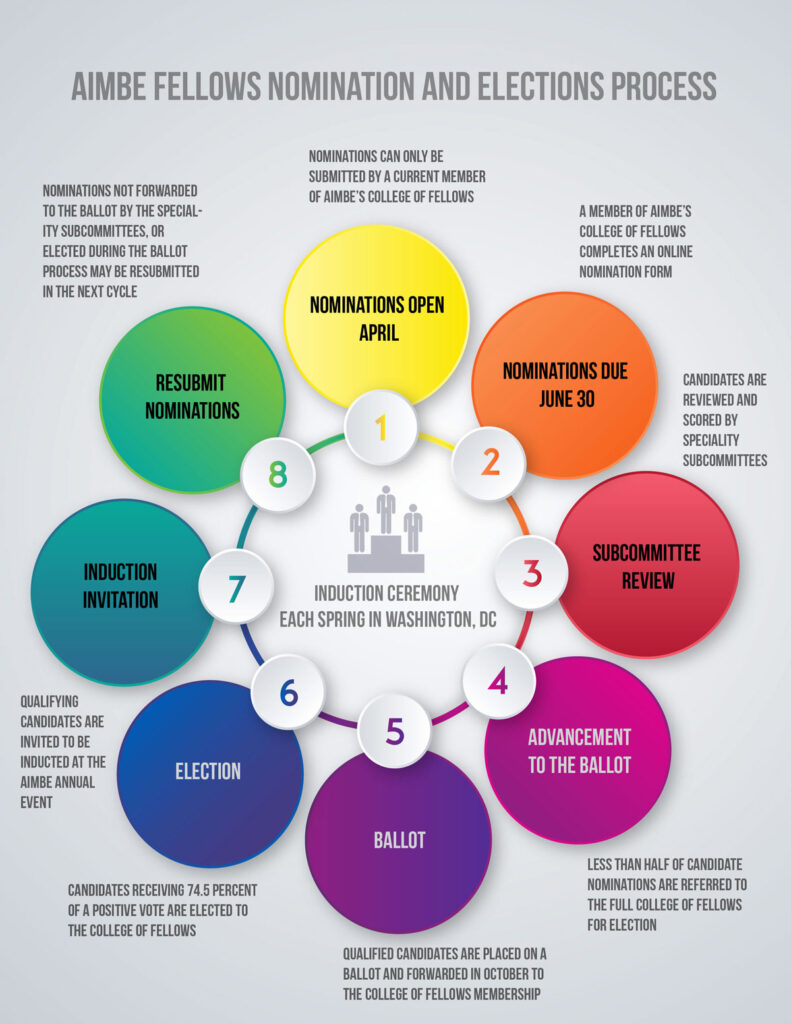The review process for international candidates submitted for consideration to the College of Fellows is separate from the domestic review process, to ensure careful consideration by international review committees.
Please note: International Fellows are limited to 10% of the total annual Fellows cohort.
International Candidates for the purpose of the AIMBE nomination process are defined as:
- Candidates that have spent or will spend the majority of their career working outside of the U.S.
- Any temporary relocation (e.g., for a sabbatical or postdoctoral training) does not impact candidacy
- Citizenship is not considered when determining domestic or international candidacy
International nominations that are submitted under a domestic nomination form and placed in a domestic review committee will be held over for the following year to be considered by the appropriate international review committee in the next cycle.
International candidates must demonstrate a connection and/or impact on the U.S. medical and biological engineering enterprise.
International Nominations must address two criteria: 1) Medical and Biological Engineering Research, Pedagogy, and/or Practice and 2) Contributions to Professional Societies/Public Service and Connection to US {examples demonstrating criteria below}. Two supporting statements of no more than 500-words each are required to address each criterion. Such statements must specify the candidate’s most significant contributions to these criteria as supported by the CV and not merely summarize the candidate’s career. In both statements, it is important to highlight the impact of the candidate in the field. Supporting documentation of a CV of (no longer than 10 pages) is required.
Supporting Examples for Criteria 1) Medical and Biological Engineering Research, Pedagogy, and/or Practice (70 points)
- Pioneering of new fields of technology or significant development in existing field
- Developing innovative approaches to engineering education
- Significant contributions to the translation of technology
- Leadership in commercialization of engineering products
- Innovative discoveries or advances demonstrating critical breakthroughs
- Nominee contribution has led to lasting impact in medical and biological engineering
Supporting Examples for Criteria 2) Contributions to Professional Societies/Public Service and Connection to US (30 points)
This section requires addressing two areas: 1) documenting a direct connection between the candidate’s experiences/expertise and AIMBE’s mission in the United States. It should also demonstrate 2) candidates’ past actions in engaging with professional societies or public organizations. Both areas must be addressed to receive maximum points. Nominators should be specific about how the candidate, in addition to their research accomplishments, has given back to the fields of medical and biological engineering for the benefit of society. Examples include:
Professional Society and Public Service
- Leadership and volunteerism in professional societies
- Engagement with community and/or public organizations
- Service on a professional society’s Board of Directors
- Direct involvement in committees, initiatives, or in the planning and execution of annual conferences for professional and scientific societies
Connection to the U.S.
- Participation in work with global policy impact, involving issues relevant in the U.S.
- Collaboration with colleagues in the US on research, commercialization, and/or practice affecting medical and biological engineering
- Demonstration of how a candidates’ work impacts medical and biological engineering in the U.S. (e.g. may include products and technologies available in the U.S.)
- Engagement with local public policy officials on issues that have global relevance
 AIMBE
AIMBE


